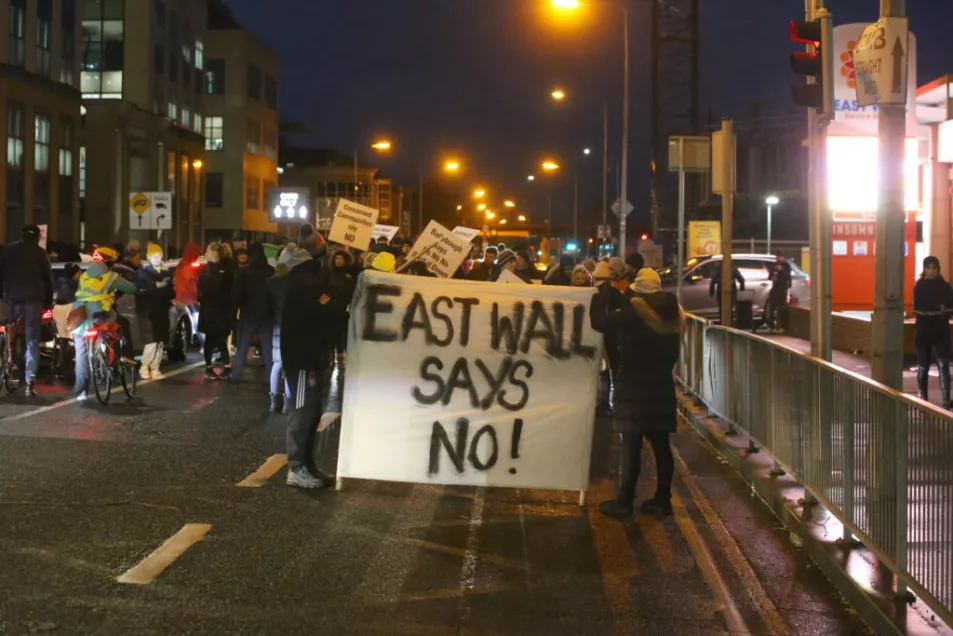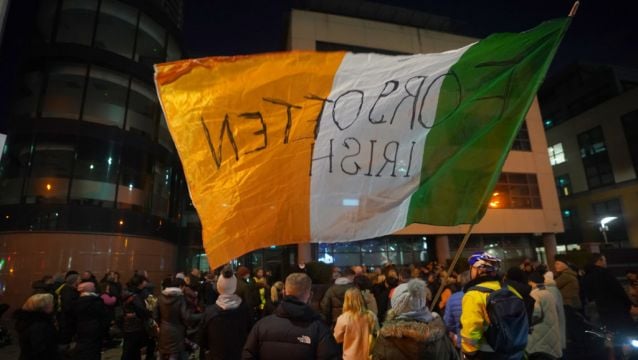Ireland's ability to house refugees and asylum seekers has come under increased strain in recent months. With protests in East Wall, Ballymun and Tallaght recently, some communities have become more hostile to accommodating migrants.
Far-right groups have capitalised on people’s real concerns to push a more sinister agenda.
Aoife Gallagher works at UK-based counter extremism think-tank the Institute for Strategic Dialogue (ISD), studying the intersection between far-right extremism, conspiracy theories and disinformation.
Speaking to BreakingNews.ie she says the far-right have used a number of tactics to grow their audience in Ireland.
“The fact is if you believe in one conspiracy theory, you are more inclined to believe in more conspiracy theories, which develops what I would describe as a conspiratorial worldview.
“An example I give is that they would read an article on BreakingNews.ie, and they won’t look at that as being fact; they look at it as if there is some agenda behind it.”
She says it also comes down to the level of trust people have in institutions which leads people down this path.
There are so many genuine reasons for why people have lost trust in institutions. There are real reasons for people not to trust politicians.
“There are so many genuine reasons for why people have lost trust in institutions. There are real reasons for people not to trust politicians.
“You have the anti-vaccine movement, you have climate change deniers, and you have the far-right anti-immigrant groups.
"What we saw during the pandemic was all these groups came together and the online ecosystem where these groups lived, completely transformed,” she says.
The landscape for the protests has also changed a lot since 2018 or 2019.
She says the online environment has become more fertile for conspiracy theories, which has led to anti-immigration rhetoric increasing.

While far-right political parties still have a presence at these protests, new figures are starting to emerge as well.
“What has really happened is that specific individuals have cropped up. While I don't really like calling them influencers, they do have an influence on people's behaviour."
New political groups have surfaced, advocating for Irish people first before accommodating asylum seekers and refugees.
“It is very much rooted in this nativist view of the world,” she says.
Scapegoats
One of the more concerning tactics that the far-right have used is hijacking movements which advocate for helping immigrants.
“Back in 2018, there was a major movement around abolishing Direct Provision," she says "The far-right would create a Facebook group called something like ‘Abolish Direct Provision’ and slowly they would start posting anti-immigrant rhetoric.
"Now they are using the very real issues such as the housing crisis and the crumbling health system to fuel anger against immigrants."
In terms of how these immigrants are portrayed, they are often viewed as scapegoats for society’s ills.
“The language they use is used is very deliberately portraying asylum seekers as being a threat. They use terms like an "invasion” of migrants; in the UK it has become so mainstream politicians are using it.
“In Ireland, they use the term plantation to draw on historical comparisons.”
They also say use terms like “unvetted men” and “military age men” to spread the idea that immigrant men are a threat.
She outlines a particular example in Ballymun where a video was shared online of migrant men coming off a bus which was framed as an “invasion”.
The way they get people onto the streets is by generating stereotypical fears.
“The way they get people onto the streets is by generating stereotypical fears,” she says.
When it comes down to it there is a vacuum of information which the Government has failed to fill with actual solutions.
Ms Gallagher admits that as a society we do not know a lot about the people coming to our country, but it is something the far-right capitalises on and fills with conspiracy theories instead.
“They make this assumption that the immigrants coming here are awful people who will do awful things to Irish people.”
There is also a distinction made between asylum seekers and economic migrants, with the latter being seen as sponging off the State as opposed to trying to seek a better life.
“It all comes down to the fact people that are pushing this are rooted in nativism and ethno-nationalism.They do not want people from other ethnicities living in this country."
Media literacy
While the far-right movement in Ireland is at the same stage as the UK or US, she thinks unless the underlying issues go unresolved, the far-right will continue to grow in Ireland.
“I don't really see this dying anytime soon. I think there is sometimes a complacency in Ireland that we are kind of immune to this stuff. We are not immune to it.
“Things could change really quickly and all it could take is one awful incident for these groups to get a better footing," Ms Gallagher says.
Thankfully there are ways to combat the far-right, but there is a lot of groundwork which needs to be done first.

“Firstly, I would say we need digital and media literacy classes in schools and libraries to empower people with the ability to spot things like misinformation and conspiracy theories is crucial," she says "Learning how the online world is structured to reward contrarianism and outrage.
“Secondly, the regulation of online platforms, including making platforms invest proper money and resources into making online spaces safe."
She says it is less about censorship but about regulating algorithms which recommend things to us and allow content to reach huge levels of virality.
The final step is something we are already seeing which is "community led initiatives who stage counter-protests which confront the 'us v them' narrative being pushed by the far-right," she says.







